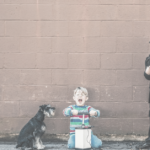
Your Child Laughs When in Trouble? How To Build Wisdom, Not Shame

What should you do if your child laughs when in trouble?
Your child does something, a big something. It’s one of those somethings that warrants sitting down and having a real chat about it. You begin the conversation, and then… well, if your child is one of the many kids that laugh when confronted, anything but a serious discussion ensues. You probably get more serious and more frustrated, and your child laughs more and gets more absurd in their silliness.
It’s not unusual for a child to laugh when in trouble. That can be challenging for us grown-ups who have a bigger appetite for serious conversations.
So let’s start with the email we received from a mom whose frustration is typical of lots of parents:
“I love the fresh perspective your resources have given our family. I’ve been using more questions, but I am struggling with my 5-year-old son. He intentionally gives wrong and silly answers to my questions when we are trying to solve issues or talk through a situation. He tends to push buttons, manipulate, and intentionally irritate others. He knows that these silly answers make solving the situation difficult. He understands what the answer could/should be and chooses the opposite on purpose. How can I help him be serious so that he can learn from the situation when he is more interested in giving a wrong answer to avoid accountability?“
Why do children laugh when in trouble?
If kids laugh when they’re in trouble, parents often think it’s because they don’t care about the misbehavior or poor attitude and are just blowing it off. But it’s usually much more complicated than that. It may even be that they care too much, making the situation more stressful than if they actually didn’t care.
And it might even be a simple issue of brain state. Skills for solving conflicts are best accessed in “medium brain energy,” which is the optimum arousal state for most situations. In this state, someone feels relaxed and alert. But when kids, like any of us, are confronted, the increased stress and anxiety can easily send them up to medium-high energy levels (or occasionally even fight/flight if they are particularly sensitive to perceived rejection).
Medium-high brain state (sometimes called the “yellow zone”) generally includes emotions like frustration, anxiety, embarrassment, and also silly or excited. A child can feel frustrated and embarrassed at their mistake, anxious about how the confrontation or consequence will go, and those uncomfortable feelings can quickly morph into silliness. Silliness provides an effective way to escape the discomfort of it all and deflect embarrassment or consequences.
As a child, Luke smiled and got silly when confronted with mistakes or misbehavior. As a young adult, he describes those memories. “I’m not sure why I smiled. I think it was nerves, discomfort, and awkwardness combined with fear of consequences or anticipating punishment.”
Luke’s dad struggled with the same thing as a child and has a depth of insight into the dynamic:
My father was very rigid and literal in his thinking. With years of living, he had learned the “right way” to do anything – fold bags, label tools, mow lawns, and more. When I made mistakes, I knew my day would take a hard pause for a thorough lesson. I was nervous about avoiding this awkwardly painful education process long before I started any project.
Sometimes, it seems, even the thought of suppressing an urge makes it grow stronger, like holding back a cough at a movie, not laughing during church, declining a cookie after dinner, etc.
Too many times, the painful thought of watching my Dad’s face get red as he paced out the “Is. This. Funny. To you?!” generated that same threat inside me to let out the opposite of what I felt! So nervous to avoid embarrassment, and yet my immature little mind/body would smile and snicker as I shook my head in complete sincerity, “No, sir- not funny, definitely (snicker, chortle), not funny at all.”
Even knowing I might receive harsh punishment, I couldn’t prevent my nervous grind at that moment. I hated that, and so did my dad. Neither one of us could understand it. We would both apologize after it happened. – John, father of 6 from MN
Such insight! I’m still chuckling over the red face and staccato speech while totally picturing how that could be me. Or maybe you….? And the more we try to stop the silliness, the more power we give it!
But hopefully, now you can understand how elevated stress, anxiety, and embarrassment can be the primary source of silliness and avoidance when correcting your child.
How can I respond when my child laughs at my efforts to discipline and build wisdom?
You’re both struggling when your little stand-up comedian is deftly averting any responsibility for his actions! Thoughtful questions based on the Connected Families Framework can help when “CORRECT” efforts seem to go awry.
- FOUNDATION: What’s going on in me? And what’s going on in my child/what is it like to be my child?
- CONNECT: How can I connect in a way that communicates safety and love?
- COACH: What can I affirm? How could I ask a question that mentors wisdom?
- CORRECT: How can I guide my child to make the situation right?
These questions can be a practical guide to thinking on your feet in challenging situations.
Foundation:
What‘s going on in me?
The well-intentioned mom who asked the original question at the beginning of the article seems to be struggling with some judgments about her child: “He intentionally gives wrong and silly answers… [and] tends to push buttons, manipulates, and intentionally irritates others.“
Kids are great detectors of a parent’s subtle irritation or condescension, so be aware if that might be part of the problem. It can be tough to engage with a heart of love for your misbehaving child. But when kids sense any kind of adversarial intentions from us, they may go right to their area of strength – silliness – to thwart our efforts to manage them.
So do what you can to get your heart to a place of treasuring your rascally little one who is probably feeling anxious and embarrassed.
What’s going on in my child/What’s it like to be my child?
It’s quite possible in this situation that your child believes:
- “If I listen carefully, I’ll feel worse about what I’ve done, so why would I do that? It just shows that, again, I’m the problem.”
- “If I’m silly, I might get some fun attention and power and distract everyone from what I’ve done wrong.”
Connect
How can I connect in a way that communicates safety and love?
Start by helping your child feel loved instead of ashamed when you address the issue:
- Step into your “kid shoes,” smile, and empathize with how challenging the situation was.
You could say something like, “Sharing toys is tough! You really love that truck!” or, “You must have been feeling really awful to have said that.” - Bring God’s grace to the shame. Smile and say, “I know you know that was wrong. But I’m so glad God loves us THIS MUCH (big gesture) when we make mistakes!!”
Often this will help a child feel safe enough to drop evasive defenses. But if your child still gets silly:
- Do something silly to reconnect. Perhaps try, “You are my beloved goofball, and I’m gonna get you!” or, “You wanna be silly? Well, watch this!” (See this article for ideas for connective play.)
- When you know your child feels loved, you can bring the issue up again in a light-hearted way, focusing on fixing the problem, not analyzing or dwelling on it.
Coach
What can I affirm?
This question helps you build on strengths toward God’s purposes. But how can you affirm something when your child has misbehaved!?
You can try to figure out what was important to your child and validate that:
- “You really love your big sister and wanted to be included with her friends.”
- “You are so creative and really wanted those Legos.”
Finding something to affirm communicates that you are looking for the good in your child instead of believing they are intentionally irritating or evasive.
How can I ask a question that mentors wisdom?
It can be easy to use black-and-white questions to trap your child into admitting guilt. Kids will resist leading or obvious questions that incriminate them, such as “Was it a kind thing you did to your sister or unkind?” Or “Why did you do that?!”
If you ask a question, make sure it’s a curious question intended to mentor wisdom:
- “What were your feelings when you had that conflict with your sister?”
- “What made it so hard to clean up your toys today?”
- If your child responds to a question with, “I dunno,” you could add, “Do you need some ideas? Because I could see how upset you were.”
Correct
How can I guide my child to make the situation right?
The big-picture goal of correction is to build the value of reconciliation, so kids have an internal desire to work through conflict instead of avoiding it or deflecting responsibility.
- “How might this problem get fixed in a way you’d feel really good about?”
- Or simply, “In our family meeting, we agreed on how you could make this right. But let’s snuggle for a little bit first so your heart is ready.”
- Do-overs can be a great way to correct misbehavior that doesn’t grow embarrassment or shame.
And be sure to celebrate when your child makes right what he’s made wrong, as you also celebrate God’s mercy and forgiveness. You can make it your prayer to exemplify this to your kids:
Yet the Lord longs to be gracious to you;
therefore He will rise up to show you compassion.
For the Lord is a God of justice.
Blessed are all who wait for Him!




